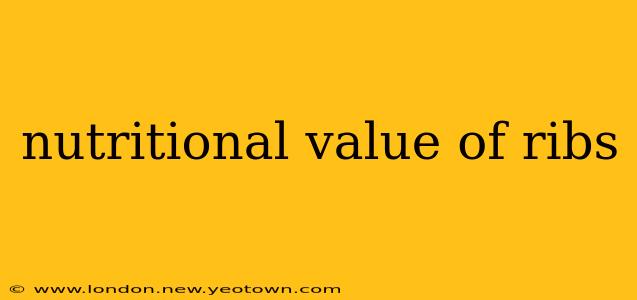Ribs. The very word conjures images of smoky grills, family gatherings, and tender, succulent meat falling off the bone. But beyond the deliciousness, what's the nutritional story behind this beloved barbecue staple? Let's dive into the juicy details of rib nutrition, exploring both the benefits and the potential drawbacks.
This isn't just about calories; we'll unpack the complete nutritional profile of ribs, addressing common questions and concerns. Get ready to satisfy your curiosity and make informed choices about enjoying this flavorful food.
What is the nutritional content of ribs?
The nutritional content of ribs varies significantly depending on the type of ribs (pork, beef, lamb), the cooking method, and the added ingredients like sauces and seasonings. However, we can look at a general overview using pork ribs as a common example. A 3-ounce serving of cooked pork ribs typically contains:
- Calories: Around 200-300 calories (depending on preparation)
- Protein: A good source of protein, providing around 15-20 grams. This is crucial for building and repairing tissues.
- Fat: Ribs are relatively high in fat, often contributing a significant portion of their calorie count. The type of fat varies; it contains both saturated and unsaturated fats. The amount of fat can vary widely based on the cut and preparation.
- Cholesterol: Ribs contribute to your daily cholesterol intake, though the exact amount again depends on preparation and cut.
- Vitamins and Minerals: While not a powerhouse of vitamins and minerals, ribs do offer small amounts of several nutrients like niacin, vitamin B6, and zinc.
Are ribs healthy?
This is a question with a nuanced answer. Ribs aren't inherently "unhealthy," but they aren't a health food either. Their high fat and calorie content means they should be consumed in moderation as part of a balanced diet. The health impact depends heavily on how often you eat them and the overall composition of your diet. Regular consumption of high-fat foods can contribute to weight gain, increased cholesterol levels, and an increased risk of heart disease.
How many calories are in a rack of ribs?
The calorie count for a whole rack of ribs is substantial, easily exceeding 1000-1500 calories, depending on the size of the rack and the cooking method. This emphasizes the importance of portion control when enjoying ribs. Sharing a rack or opting for a smaller portion can significantly reduce your calorie intake.
What are the benefits of eating ribs?
Despite their high-fat content, ribs do offer some benefits:
- Good Source of Protein: Ribs are a great source of protein, essential for building and maintaining muscle mass. Protein is crucial for numerous bodily functions.
- Iron and Zinc: Ribs contain small amounts of iron and zinc, which are vital for various bodily functions, including immune function and red blood cell production.
Are ribs high in cholesterol?
Yes, ribs are relatively high in cholesterol, particularly if they are prepared with fatty cuts of meat. High cholesterol intake is a risk factor for heart disease. Therefore, it's important to be mindful of your cholesterol intake from all sources, including ribs. Individuals with high cholesterol should limit their rib consumption.
What are some healthier ways to cook ribs?
While you can't entirely eliminate the fat content of ribs, you can make healthier choices in preparation:
- Trim Visible Fat: Before cooking, trim away as much visible fat as possible from the ribs. This can significantly reduce the overall fat content.
- Baking or Grilling: Opt for baking or grilling instead of frying. These methods allow excess fat to drip away, reducing the fat content of the final product.
- Healthy Marinades and Sauces: Use leaner marinades and sauces to avoid adding excessive sugars and fats. Opt for herbs and spices instead of heavily processed sauces.
Conclusion: Enjoy Ribs Responsibly
Ribs offer a delightful taste experience, but their high fat and calorie content demands mindful consumption. By understanding their nutritional profile and making smart cooking choices, you can enjoy this delicious food without compromising your health. Remember, moderation is key to enjoying ribs as part of a balanced diet. So, fire up the grill responsibly and savor the flavor!

